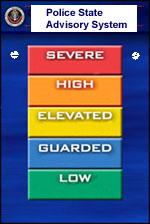From the United States Coast Guard site, new rules for calculating how many people can get on a boat. Not as many, since we all weigh too much, and the average weight of an American is sure as heck not just 160 pounds anymore. That used to be the number used for calculations. My only question remaining is this: is 185 pounds too low?
On December 1, 2011, the Assumed Average Weight Per Person (AAWPP) of 185 pounds becomes effective. Documents associated with the AAWPP and the basis for its determination can be accessed below. These include:
the Final Rule that announces the AAWPP and how it will be updated (Document No. 1);
the Small Entity Compliance Guide that outlines what owners and operators need to do to comply with this Final Rule (Document No. 2);
the Notice of Proposed Rulemaking that discusses the basis by which the AAWPP of 185 pounds is determined (Document No. 3);
the Federal Register notices that discuss the voluntary interim measures for domestic vessel passenger weight (Document Nos. 4 and 5);
reports issued by the National Center for Health Statistics (NCHS) that contain the source data used in obtaining a AAWPP update (Document Nos. 6, 7, and 8);
the FAA advisory circular that provides aircraft operators with guidance on how to develop and receive approval of a weight and balance control program (Document No. 9); and
the USCG Office of Field Activities (CG-543) Homeport site on Passenger Weight and Vessel Stability Requirements (Document No. 10).
Note that this is a trend. Apparently we are so overweight we need a new generation of ambulances to transport our lumbering bodies in emergencies.
Take, for instance, our new ambulance problem: Cities around the country are now having to rapidly expand ambulances in order to keep up with the corpulence of the patients riding in them.
Boston was one of the first to retrofit their ambulances to accommodate more obese passengers—a $12,000 process—and now Fort Worth, Texas, is following suit, at the cost of $7,000 per vehicle. Fort Worth is also getting stretchers built to support 650 pounds, as the old ones, with their 500-pound limits, were occasionally proving inadequate. Boston’s stretchers cost $8,000 a piece and can withstand 850 pounds.
And, if you are planning to leave the driving to someone else, it looks the government is having to adjust size of seating on buses to accommodate our extra weight rear ends. Hurry, comments are still open, and it is still possible to point out to them they are probably grossly underestimating how fat we as a nation have become.
DEPARTMENT OF TRANSPORTATION
Federal Transit Administration
49 CFR Part 665
[Docket No. FTA-2011-0015]
RIN 2132-AB01Bus Testing; Calculation of Average Passenger Weight and Test
Vehicle WeightAGENCY: Federal Transit Administration (FTA), DOT.
ACTION: Notice of proposed rulemaking.
———————————————————————–
SUMMARY: The Federal Transit Administration (FTA) is proposing to amend
its bus testing regulation to more accurately reflect average passenger
weights and actual transit vehicle loads. Specifically, FTA is
proposing to change the average passenger weight from 150 lbs to 175
lbs. In addition, FTA is proposing to change the floor space occupied
per standing passenger from 1.5 to 1.75 square feet, and updating the
Structural Strength and Distortion test procedures.DATES: Comments must be received no later than May 13, 2011. Late-filed
comments will be considered to the extent practicable.
I know there is some heavy irony in the next report, so I will just let it speak for itself about Americans and their problems with obesity. I will have to point out, though, that if we are seeing this rapid increase in weight of young children, that does not auger well for the future in regard to stopping this epidemic of obesity.
Current child safety seats for kids between one and four years old are tested up to a maximum of 40 pounds, while belt-positioned booster seats, which protect kids weighing more than 40 pounds, are only safe for taller children aged four and above. The problem is that overweight and obese toddlers are reaching 40 pounds by the age of two and a half, which means that they are too heavy for the forward-facing safety seats and too young and short for the shoulder-best booster seat.
This issue was supposed to be addressed as early as 2002, with “Anton’s Law.” Anton Skeen was a 50-pound four-year-old who died when his seat belt failed in a car crash in 1996. The Washington Post reports that, although Anton’s Law required a lifelike, heavier crash test dummy to be developed within two years, “the 78-pound dummy is still in development nearly a decade later.”
U.S. Obesity Epidemic Now Requiring Fatter Crash Test Dummies
In all fairness, I note that I must correct the title of this article. We are apparently no longer Number 1, i.e. we were but are no longer the fattest nation in the world. We are now it would seem only Number 2. Maybe we are just not trying hard enough?
It’s not exactly good news, but the United States is no longer the world’s fattest nation. It turns out that the rest of the world is gaining on us, putting on more weight at a faster pace. This is especially true in Pacific island nations and in the Middle East, where the United Arab Emirates Kuwait now represents the world’s fattest industrialized nation. Both regions seem to be struggling to adapt to modern, sedentary lifestyles over a rather short period of time.
The most recent data comes from an exhaustive country-by-country report on obesity from the Imperial College London, Harvard University, and the World Health Organization, which was published in The Lancet.
…
Altogether, this means that one in nine people around the world are obese—highlighting the growing global problem with overnutrition and the urgent need to both increase physical activity and to eat healthier.Feast Your Eyes: The United States Is No Longer the Fattest Country


